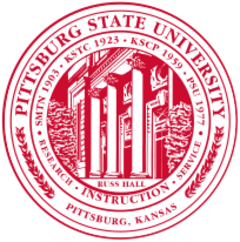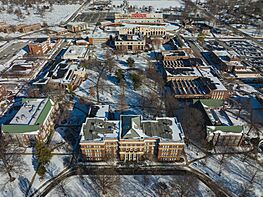Pittsburg State University facts for kids
 |
|
|
Former names
|
Auxiliary Manual Training Normal School (1903–1923) Kansas State Teachers College of Pittsburg (1923–1959) Kansas State College of Pittsburg (1959–1977) |
|---|---|
| Motto | "By doing, learn." On seal: "Research, Instruction, Service" |
| Type | Public university |
| Established | March 6, 1903 |
|
Parent institution
|
Kansas Board of Regents |
| Accreditation | HLC |
|
Academic affiliation
|
|
| Endowment | $74.6 million (2020) |
| President | Dan Shipp |
| Provost | Susan Bon |
|
Academic staff
|
301 |
| Students | 5,774 (fall 2024) |
| Location |
,
Kansas
,
United States
37°23′29″N 94°42′09″W / 37.3913°N 94.7024°W |
| Campus | Distant town, 223 acres (0.90 km2) |
| Other campuses | Kansas City |
| Newspaper | The Collegio |
| Colors | Crimson and Gold |
| Nickname | Gorillas |
|
Sporting affiliations
|
NCAA Division II – The MIAA |
| Mascot | Gus the Gorilla |
  |
|
Pittsburg State University (often called Pitt State or PSU) is a public university in Pittsburg, Kansas, United States. It is a place where students can learn and grow. The university has about 7,400 students, including those studying for their first degree and those doing advanced studies. It is part of the Kansas Board of Regents, which helps guide public universities in Kansas.
Contents
History of Pittsburg State University
| Naming history | |
| Years | Name |
|---|---|
| 1903–1923 | Auxiliary Manual Training Normal School |
| 1923–1959 | Kansas State Teachers College of Pittsburg |
| 1959–1977 | Kansas State College of Pittsburg |
| 1977–present | Pittsburg State University (PSU) |
Pittsburg State University started in 1903. It was first called the Auxiliary Manual Training Normal School. It was a part of another school, the State Normal School of Emporia. In 1913, it became its own four-year school. It then dropped "Auxiliary" from its name.
In 1923, the school changed its name to Kansas State Teachers College of Pittsburg. People often called it Pittsburg State. Over the years, the school began to teach more than just how to be a teacher. Because of this, its name changed again in 1959 to Kansas State College of Pittsburg. Finally, on April 21, 1977, it became Pittsburg State University.
Leaders of the University
Pittsburg State has had 11 leaders since it began. The first leaders were called "principal" from 1903 to 1913. After 1913, the leader's title changed to "president."
- Russell S. Russ (1903–1911)
- George E. Myers (1911–1913)
- William A. Brandenburg (1913–1940)
- O. P. Dellinger (1940–1941)
- Rees H. Hughes (1941–1957)
- Leonard H. Axe (1957–1965)
- George F. Budd (1965–1977)
- James Appleberry (1977–1983)
- Donald W. Wilson (1983–1995)
- John R. Darling (1995–1999)
- Tom W. Bryant (1999–2009)
- Steven A. Scott (2009–2022)
- Dan Shipp (2022–present)
Campus and Buildings
The main campus of Pittsburg State University is in southeast Kansas. It covers about 223 acres, which is a large area.
One important building is Porter Hall, built in 1927. It is named after Ebenezer F. Porter. He was a state lawmaker who helped the school get started and get money.
The campus also has the Kansas Technology Center. This is a very modern building for technology programs. It is the largest academic building in Kansas. In December 2014, the university opened the Bicknell Family Center for the Arts. This center gives the university a great place for performances. It has a large performance hall and a smaller theater. There is also an art gallery and space for music groups to practice.
Pittsburg State also has other locations. It has a campus in the Kansas City area. This campus offers different bachelor's and master's degrees. Two degrees are also offered in Salina, Kansas. These are on the campus of Salina Area Technical College.
Academics and Learning
PSU is organized into different schools and colleges. These are like different departments where students can study specific subjects.
- College of Arts and Science
- Kelce College of Business
- College of Education
- College of Technology
The Kelce College of Business has a special approval called AACSB. This means it meets high standards for business education. The university also has research centers. These include the Business & Technology Institute and the Kansas Polymer Research Center. The Polymer Research Center is in the new Tyler Research Center building.
Athletics and Sports
The sports teams at Pittsburg State are called the Gorillas. The university is part of NCAA Division II. This is a group of colleges that compete in sports. They mainly play in the Mid-America Intercollegiate Athletics Association (MIAA). Pittsburg State has been part of this group since 1989. Before that, they played in other sports conferences.
Pittsburg State has 12 different sports teams for men and women. Men's sports include baseball, basketball, and football. They also have cross country and track & field. Women's sports include basketball, softball, and volleyball. They also have cross country and track & field.
Football Success
The Pitt State football team started in 1908. They have won more games than any other team in NCAA Division II history. They have won national championships four times. These wins were in 1957, 1961, 1991, and 2011. In 2011, Pittsburg State won the national championship by beating Wayne State University 35–21.
The Gorillas have also won many conference championships. They have won or shared 27 conference titles. Their games against Northwest Missouri State University are very popular. These games are played at Arrowhead Stadium in Kansas City, Missouri. In 2002, over 26,000 people watched one of these games. This was the most people to ever watch a Division II game.
The Gorillas Mascot
Pittsburg State University is the only university in the United States with a gorilla as its mascot. The idea for the gorilla mascot came about in 1920. It was officially chosen on January 15, 1925. The current mascot's name is Gus. Gus was designed in 1985 by L. Michael Hailey.
Apple Day Tradition
In 1907, some people from Pittsburg went to the state government. They wanted money to build the first building for the new university. One of them, Pittsburg mayor Clarence Price, accidentally broke a rule. He did not leave the room before the meeting started. The lawmakers jokingly told them they had to pay a fine of a barrel of apples. After that, they gave the university the money.
When the men returned to Pittsburg, the students thought this story was very funny. Students used to get in trouble for missing class. Since the teachers had missed class to go to the meeting, the students decided the teachers should also pay the apple fine.
So, on March 6, 1908, classes were canceled for the whole day. This was for the first Apple Day. During a program that afternoon, the students again fined the teachers a barrel of apples. This is how the special tradition of teachers bringing apples for their students at Pittsburg State began.
Notable People from Pittsburg State
Many interesting people have been part of Pittsburg State University.
- Fira Basuki, a writer
- John Brown, a football player for the Buffalo Bills
- Gary Busey, a film actor
- Terry Calloway, a former politician in Kansas
- Eldon Danenhauer, a football player for the Denver Broncos
- Ralph Earhart, a former NFL football player
- Dennis Franchione, a former head football coach
- Eugene Maxwell Frank, a bishop in the United Methodist Church
- Willie Fritz, a current head football coach at Tulane University
- Kendall Gammon, a former NFL football player and current radio analyst
- Don Gutteridge, a Major League Baseball player and manager
- Jay W. Hood, a major general in the U.S. Army
- David P. Hurford, a psychologist who studies dyslexia
- John E. Jacobs, a director of special education in Kansas
- Inez Y. Kaiser, the first African-American woman to run a public relations company with national clients
- David Kan, a businessman
- Jennifer Knapp, a musician
- Jake LaTurner, a member of the U.S. House of Representatives
- Sherm Lollar, a baseball player
- Aaron McConnell, a football player
- Ronald Moore, a former NFL football player
- Brian Moorman, an NFL punter
- Sam Pittman, a head football coach for the Arkansas Razorbacks
- Jim Press, a former vice chairman and president of Chrysler
- John Roderique, a successful high school football coach
- H. Lee Scott, a former president and CEO of Wal-Mart
- Steven A. Scott, the ninth president of Pittsburg State University
- Michael Shonrock, a former president of Emporia State University
- Joe Skubitz, a U.S. representative
- Sally Stonecipher, the first female U.S. Army helicopter pilot
- James Tate, a writer who won the Pulitzer Prize for poetry
- Duane Thiessen, a lieutenant general in the United States Marine Corps
- Ahasanul Islam Titu, a member of parliament and minister in Bangladesh
- Lucinda Todd, a civil rights activist
- Jackie Vietti, a president of Butler Community College
- Steve Weddle, a novelist
- Pat Woodrum, an executive director of botanical gardens and libraries
- Darryl Wren, a former NFL football player
- Douglas Youvan, a biophysicist
 | Janet Taylor Pickett |
 | Synthia Saint James |
 | Howardena Pindell |
 | Faith Ringgold |



